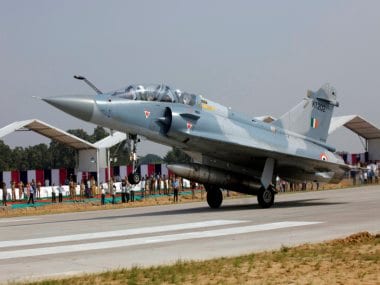The operation has allegedly led to the "complete destruction" of the terrorist camp in Balakot sector of Pakistan. Indian pilots, it is being reported, have returned to safety, while 200 to 300 people have reportedly died on the Pakistan side.
However, Major General Asif Ghafoor, spokesperson of the Pakistan army, claimed that the attack had failed to cause any damage to Pakistan. He wrote on Twitter that the Indian side, "facing timely and effective response from Pakistan Air Force released payload in haste while escaping."
If reports are confirmed, then the Mirage 2000s have once again proven to be the hero of yet another operation by the Indian Air Force. The jets first gained prominence after what was reported to be their success in the 1999 Kargil war.What is Dassault Mirage 2000 The Dassault Mirage 2000 is a French multirole, single-engine fourth-generation jet fighter manufactured by Dassault Aviation, the same company at the centre of the contentious Rafale jets deal. It comes with several variants which have been sold to as many as eight countries, including Peru, Egypt, India, UAE, Qatar, Brazil, Taiwan and Greece. Mirage 2000 has nine points for carrying weapon system payloads, five on the fuselage and two on each wing, reports AirForce Technology. The single-seat version is also armed with two internally mounted, high-firing-rate 30mm guns. Air-to-air weapons supported by the Mirage 2000 include the MICA multitarget air-to-air intercept and combat missiles, and the Magic 2 combat missiles, both from MBDA (formed out of a merger between Matra BAe Dynamics, EADS Aerospatiale and Alenia Marconi Systems). MICA supports a maximum operating range of 60 kilometres. The aircraft can carry four MICA missiles, two Magic missiles and three drop tanks simultaneously. The Mirage 2000-5 can fire the MBDA Super 530D missile or the MBDA Sky Flash air-to-air missile as an alternative to the MICA missile.
The Mirages sold to India were reported to have had limited air interdiction, which cuts down on the use of preventive aircraft attacks against enemy targets, and had to be modified significantly.
India's Mirage 2000Hs had to be fitted with a Thomson-CSF Laser Designator Pod, known as "ATLIS", which was capable of delivering 1000 kg laser-guided bombs, which were purpose-built for the destruction of reinforced targets, says Bharat Rakshak. Parts to fit in an additional Paveway II laser-guided bomb kit had to be remanufactured by the IAF as India had been put on the embargo list at the time, following nuclear tests in Pokhran.
The Mirage in the 1999 Kargil War
During the Kargil War, India also had MiG-21s, MiG-23s and MiG-27s in its arsenal, but these jets – lacking modern weapons – had not been making a significant impact on hard-to-locate enemy positions. While pilots helming the MiG-23 and MiG-27 were used to manual dive-bombing runs, and this tactic was not suited in the rarefied atmosphere of the Himalayas.
It was at this point, says Russia Beyond, that the IAF introduced the Mirage 2000H. On 24 June, 1999, two of the aircraft struck and destroyed the command and control bunkers of Pakistan's Northern Light Infantry. Pakistan's military prowess in the war had been significantly dented since the attack, resulting in a victory for India.
During Operation Safed Sagar from June to July 1999, two Mirage squadrons flew a total of 514 sorties. The number one squadron flew air defence and strike escort missions, while the number seven squadron conducted 240 strike missions.
The impressive service of the Mirage 2000 in 1999 prompted the government to approve the purchase of ten Mirage 2000Hs, featuring improved avionics, particularly an upgraded RDM 7 radar.
The 'new' Mirage
In 2004, when India made its third order for the type, the government announced its intention to upgrade its existing Mirage 2000s. The new Mirage 2000, redesignated the Mirage 2000 I, is almost incomparable with the original jet, reported NDTV. At the heart of the upgrade is a new Thales RDY 2 radar, which allows for very long-range engagement of targets in the air, automatic tracking of targets, mapping of targets on the ground using Doppler beam-sharpening techniques, and the ability to track and engage targets which are moving on the ground. The pilot of the new Mirage 2000 is now able to see superimposed radar data on his helmet display, without having to look at any of the references inside the cockpit.
On 1 February, a Mirage 2000 trainer aircraft crashed at the HAL Airport in Yemlur of Bengaluru, ahead of the Aero India show. Even though both the pilots ejected, one died after landing on the aircraft’s wreckage.
https://www.firstpost.com/india/12-mirage-2000-jets-strike-pakistan-all-you-need-to-know-about-dassault-made-aircraft-that-played-key-role-in-kargil-war-6153001.html

No comments:
Post a Comment